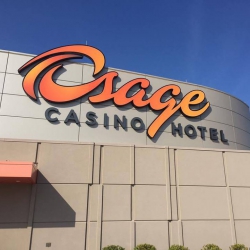
The Osage Nation owns 9 casinos in Oklahoma.
The Osage Nation of Oklahoma hired lobbyists this week to help its bid for a Missouri casino. The main lobbyist hired is Steve Tilley, the former Missouri Speaker of the House.
The firm hired is Strategic Capitol Consulting Firm, which is affiliated with Steve Tilly. According to an August 15 filing with the Missouri Ethics Commission, the Osage Nation hired Tom Robbins, Shawn Rigger, and Steve Tilley — all employed by Strategic Capitol.
The decision comes after a year of cultivating friendships in Missouri politics. In December 2016, the Osage Nation spent $52,000 to help cover the expenses of Missouri Gov. Eric Greitens’ (R) inaugural festivities.
Geoffrey Standing Bear on Inauguration Checks
Osage Nation Chief, Geoffrey Standing Bear, told the St. Louis Post-Dispatch that his tribe wrote two separate inauguration checks in order to establish a good relationship with Gov. Greitens.
Of the political contributions, Standing Bear told the Post-Dispatch, “We thought we would show him respect.”
Osage Nation: Prospective Casinos
The Osage Nation wants to build a casino near the City of Cuba on I-44, about 80 miles to the southwest of St. Louis. Alternately, the tribe has looked at land in Kimberling City, a more remote area in southwest Missouri.
A third possible location for an Osage Nation casino would be the Lake of the Ozarks region, located in mid-Missouri. Any of the three locations would need Governor Greitens’ direct approval.
Indian Gambling Regulation Act
Federal law allows Native American tribes to build casinos outside of their home state, but only under specific circumstances. Approval under the terms of the Indian Gambling Regulation Act (IGRA) is much more complicated when building off-reservation and in another state.
The Osage Nation currently operates 7 tribal casinos throughout Oklahoma, including larger operations in Tulsa, Pawhuska, and Ponca City. With that kind of money, the tribe has the funds to consider expanding operations outside the state.
Steve Tilley: Lobbyist Extraordinaire
Former House Speaker Steve Tilley is a good choice for a Missouri lobbyist. Few politicians can boast the kind of insider knowledge of Missouri politics as Tilley, or his web of political contacts.
Steve Tilley first was elected to the Missouri House of Representatives in 2004. In the wave election of 2010, Tilley became the Missouri Speaker of the House. At the time he left office in 2012, Steve Tilley presided over a veto-proof majority of 109 GOP lawmakers. Many of those Republican legislators remain in office to this day.
The former speaker will split his duty as a lobbyist between the Osage Nation and three other firms: Uber, Anheuser-Busch, and Express Scripts.
Tom Robbins’ Missouri Connections
Tom Robbins is also well-connected within the state. Robbins served as general counsel to former Missouri State Treasurer Sarah Steelman. Steelman now serves as the Commissioner of the Office of Administration for Missouri, and is considered a key adviser to Eric Greitens.
Missouri Tribal Casino Lobbyists
The Osage Nation is likely to face opposition from Missouri’s existing tribal gaming authorities. The Missouri Gaming Commission reported that the existing 13 tribal casinos in Missouri raised $221 million in taxes for Missouri schools in 2016. Giving the rate of taxation on tribal casinos, that means the existing tribal casinos represent a $2 billion-a-year industry. All 13 of those casinos also have lobbyists on retainer.
The hiring of Steve Tilley comes at a time when the reputation of lobbyists is at an all-time low. In the 2016 US presidential election, rally attendees sometimes chanted “Drain the Swamp”. While different politicians and voters have different interpretations of what “the Swamp” is, it most commonly refers to the longtime lobbyists who fill up the halls of the U.S. Congress. To a lesser extent, state-level lobbyists are included in the swamp.
Despite the general dislike of such lobbyists, they are a common and vital part of the U.S. democratic process. Without the ability to speak to lawmakers, various special interests would have few ways to get their point across to the decision makers. Only indirect means would exist, such as the newscasts, newspapers, and magazine which exist to inform the public or sway public opinion.
